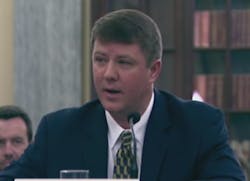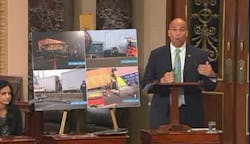Trucking touts safety investments, wants FMCSA to see data ‘without political lens'
Touting trucking’s $7 billion investment in safety and a resulting improvement in fatal crashes over the last decade, an industry spokesman on Thursday told a Senate committee that federal regulators should focus on the primary causes of crashes and not on “peripheral issues.”
One senator, however, questioned that recent safety record – and the industry’s attempt to undo fatigue regulations.
Jim Mullen, executive vice president and general counsel of Werner Enterprises, spoke on behalf of American Trucking Associations before the Senate Commerce, Science and Transportation’s subcommittee on surface transportation.
“The trucking industry is justifiably proud of its commitment to safety,” Mullen said. “These investments in safety have yielded impressive dividends for the industry. Over the past decade, the number of large truck-related fatalities has dropped 21% and the large truck fatality rate has dropped 37%.”
Mullen specifically cited investments in progressive safety technology and driver training as helping to lower Werner’s preventable crashes by 22% between 2007 and 2014.
In response to a question on top priorities from Sen. Deb Fischer (R-NE), the committee chair, Mullen challenged the Federal Motor Carrier Safety administration to “look at the data without any political lens.”
“Let’s focus on the core factors that cause crashes, speed and those sorts of things,” he said. “It’s not so much the integrity of the data; it’s the manner in which we’re looking in order to provide the biggest bang for the buck in improving highway safety.”
Senator has doubts
Sen. Cory Booker (D-NJ) – who led the floor fight last June to oppose suspension of the 2013 changes to the hours of service (HOS) restart provision – suggested that truck accidents, in fact, are going up “in a startling and unfortunate way,” and he questioned why the industry is “pushing for a roll back of commonsense sleep regulations.”
Booker also questioned why the minimum truck insurance is only $750,000 when truck accidents cost society $99 billion a year, including a fatal multi-vehicle accident that costs as much as $20 million in care and compensation, along with damage to the highways – a cost born, he contended, by taxpayers.
Mullen conceded that “driver error is the top cause of accidents,” but he discounted the impact of fatigue in most of those accidents. He also countered that accident frequency had improved under the pre-2013 restart regulation. The change takes away driver scheduling flexibility and puts more trucks on the road during peak traffic hours, he explained. He also noted the science that FMCSA used to justify the change was flawed, and contradicted previous findings.
And he dismissed the notion that drivers are routinely clocking an 80-hour work week, saying such a schedule would only be possible “in a perfect freight world,” and that “in the real world, that 80-hour week just doesn’t really occur.”
“It’s not so much the hours of service that we should be focused, it’s other things like speed,” Mullen again said, and referred to ATA’s push for a speed-limiter mandate. “How often do you ask for regulations? We just have a difference of opinion on how to go about attacking the safety problem.”
Support for gas tax
In other testimony, former Pennsylvania Gov. Ed Rendell enthusiastically supported raising the federal tax on motor fuels (which ATA strongly supports) as well as giving states the right to toll existing Interstate highways (which ATA opposes).
Rendell put the cost of a 10 cent increase in the gasoline tax at $2 a week for the typical consumer, compared to the annual $818 “cost of inaction,” in terms of vehicle repairs and wasted time in traffic.
“Do your job. The Chamber of Commerce and the AFL-CIO, who probably couldn’t agree today’s Thursday, they agree that we need to raise the gas tax,” said Rendell, co-chair of Building America's Future. “We will support you. The American people will grumble for a little bit, but after a while they won’t have any idea that you raised the gas tax.”
ATA wishlist
Among the specific solutions Mullen told Congress the government should consider were:
- Advancing a long awaited rule requiring the use of speed limiters on large trucks;
- Shifting from a vehicle-centric roadside inspection enforcement model to a more effective model centered on on-road traffic enforcement and driver behavior;
- Incentives for the use of crash avoidance technology like lane departure warning systems and forward collision warning systems;
- Timely publication of a strong and appropriate mandate for electronic logging devices;
- Developing robust driver training rules focusing on performance and comprehension, not hours of education;
- Reworking the Compliance, Safety, Accountability system to better focus on truly high-risk carriers, specifically by re-examining the role of crash data in CSA scores;
- And finally, Congress must carefully monitor the ongoing studies of the suspended changes to the hours-of-service restart rules.
About the Author
Kevin Jones 1
Editor
Kevin has served as editor-in-chief of Trailer/Body Builders magazine since 2017—just the third editor in the magazine’s 60 years. He is also editorial director for Endeavor Business Media’s Commercial Vehicle group, which includes FleetOwner, Bulk Transporter, Refrigerated Transporter, American Trucker, and Fleet Maintenance magazines and websites.

